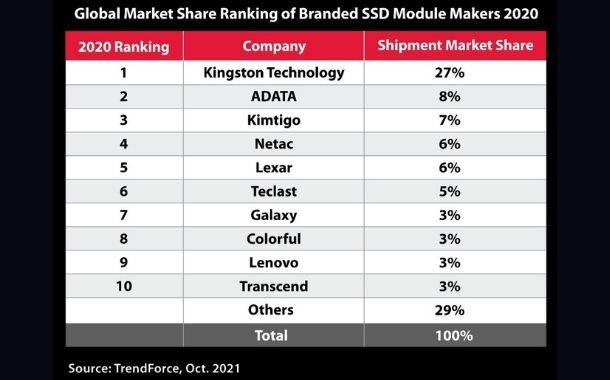Kingston Technology provides a variety of encrypted storage products stretching from USB to SSD drives. The current encryption flagship products include encrypted USB and encrypted SSD.
With a global shift from a full-time office set up to be working and studying remotely, many companies, schools and parents had to provide their employees and students with portable devices such as laptops or upgrade the SSD and DRAM drives of already existing modules to ensure a smooth transition, living up to an office experience.
The shift of processing data at its origin, will in turn drive the need for IT equipment such as memory and storage.
In addition, Kingston has also experienced a surge in SSD and DRAM updates, due to consumers recognising the relationship between high memory and storage needs and the usage of videoconference tools such as Zoom and Teams.
With devices leaving the office premises on a near to permanent basis, a rise in the importance of encrypted SSD and USB drives has also been noticed.
Kingston Technology would like to highlight the IronKey S1000, which is FIPS 140-2 Level 3 certified, and features 256-bit AES hardware encryption in XTS mode. Additional features include Self-Destruct mode or Reset mode.
In terms of encrypted SSD drives, the KC2500, KC600 and the A2000 SSD should be named. The KC600 is a 2.5″ and mSATA SSD and the KC2500 and the A2000 are NVMe PCIe SSDs, offering AES 256-bit hardware encryption, TCG Opal and eDrive a security storage specification for use with BitLocker.
To ensure that AI can live up to our expectations, it is essential to reduce latency through edge computing.
Industries, including the financial and healthcare sector, are combining the power of big data, AI, and ML to plan, learn and achieve future growth. AI applications, through machine learning and deep learning, are equipped to self-optimise and self-learn. By analysing a huge chunk of information from multiple sources, AI can effectively deliver faster and more efficient services to customers.
However, AI will also drive the creation of new data. To ensure that AI can live up to our expectations, it is essential to reduce latency through edge computing. This shift of processing data at its origin, will in turn drive the need for IT equipment such as memory and storage.
AI will also drive the creation of new data.
At Kingston it is strongly believed that education in the channel is the best approach to ensure that IT partners have the tools to explain why and how to protect your data.
Kingston’s Partner Programme which in the coming weeks will undergo a facelift, is the go-to place for getting this information. It actively helps to form a bigger network of people who understand that their data needs to be protected and that there are vulnerabilities that can be eradicated through endpoint security, encryption, anti-malware software and more.
Kingston recognises the channel as the core point of communication with customers. Even though a reasonably suitable product can be purchased on the internet, when it comes to having questions on what systems are the right fit to enable a smooth transition or workload, at Kingston it is still believed, that the best way is to be advised by an expert.
With devices leaving the office premises on a near to permanent basis, a rise in the importance of encrypted SSD and USB drives has been noticed.

























